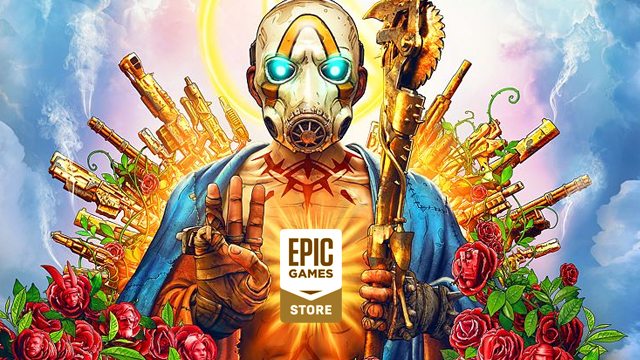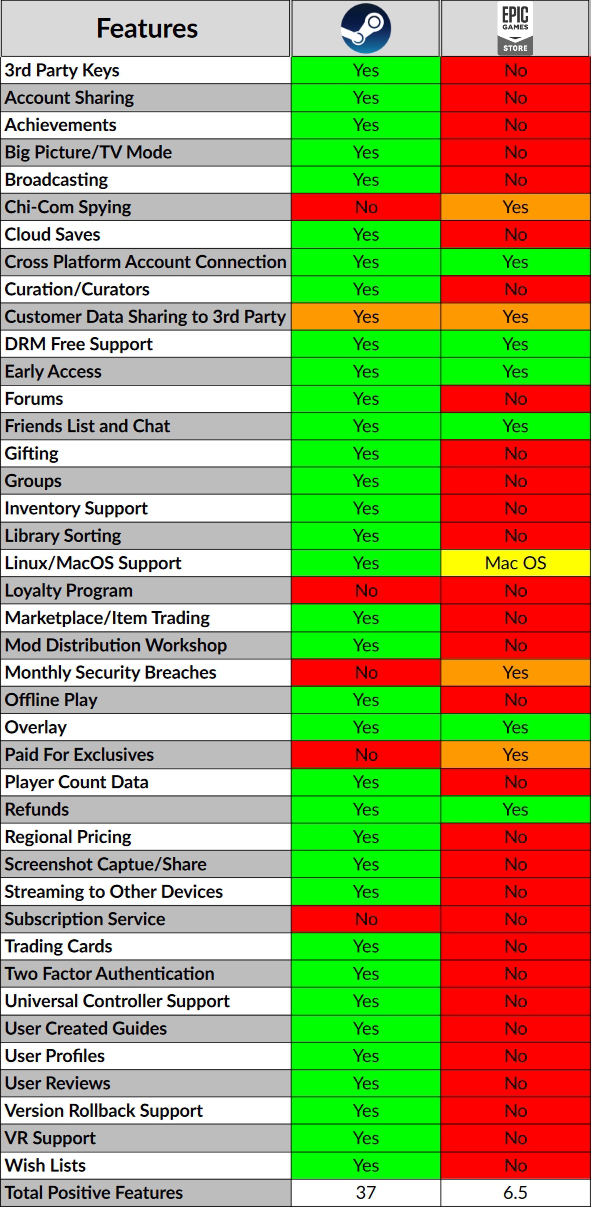Just a few short months ago, the Epic Games Store debuted to fanfare and a boatload of criticism. A new player was on the block and it was bringing with it some original games, a boatload of exclusives — something utterly alien to the PC gaming world — and a whole bunch of other problems. A lacking feature set, suspicions of Chinese spying, and anger over poaching games from Steam have beleaguered Epic Games since the store first got off the ground. Why don’t people like the Epic Games Store? Like many questions in the business side of the gaming world, the answer to the Epic Games Store controversy is a complex, multifaceted issue that isn’t as simple as it might seem on its face.
Exclusivity breeds bitterness
One of the things the Epic Games Store is most well known for is the number of exclusives Epic has snapped up. There have been both good and bad things in this aspect of the Epic Games Store controversy.
Securing PC versions of games that likely would not have otherwise come to PC is a good thing. Journey is the most obvious example in this category. A beloved game that was once exclusive to the PlayStation ecosystem can now finally be able to be enjoyed by PC players, largely because Epic Games (probably) handed the publisher a proverbial sack of cash. This is good for PC gamers and it’s hard to argue against it; Journey would likely not be coming to PC otherwise.
“Debut exclusives” are the sightly more contentious topic. Quantic Dream’s games — also formerly exclusive to the PlayStation ecosystem — were recently announced as one-year exclusives for the Epic Games Store. Games in this category could have debuted on other platforms, but they haven’t. Firm details are hard to come by, but Epic Games probably offered the publisher some kind of incentive for the one-year exclusivity deal.
Neither of these previous two categories is all that bad as PC gamers didn’t really “lose” anything in those cases. The final category, however, is the one that has caused the most headaches for Epic Games (and anyone else trying to make sense of this whole thing): exclusives that are perceived to have been “stolen.”
Metro Exodus is probably the most prominent early example of an Epic Games Store exclusive that upset a decent number of people. The game was advertised as coming to Steam, but the publisher(s) ultimately pulled it from sale and simultaneously announced that it would be exclusive to Epic Games’ digital distribution service just a couple of weeks before it was supposed to launch. Steam pre-orders would be honored, but a significant number of people who avoided pre-ordering the game (either through circumstance or on principle) were understandably upset that they could no longer get it for the client they had expected. In a sense, these folks had the rug pulled out from under them. Even Valve appeared to have been blindsided by this move.
Exclusivity always brings a level of fanboyism, rational or not. There are Steam fanboys who decried the exclusivity and Epic Games Store fanboys who celebrated it. Aside from this visceral reaction, there were also more practical matters: the feature set of the Epic Games Store is just plain lacking.
The Epic Games Store lacks features
There are probably several dozen digital distribution clients out there in the world. Steam is the biggest one on PC, with Origin, Blizzard Battle.net, GOG.com, and Uplay each doing their best to provide healthy competition. Despite those efforts, Steam still holds a considerable amount of the market share. That has a lot to do with the massive lead time Valve has had with their digital distribution service as it’s hard to compete against a decade-and-a-half of development. That’s a hell of a head start.
The Epic Games Store is no different, and it inarguably lacks features when compared to Steam (and many of its other competitors) as the image shows quite well. However, it is a little biased. For example, one of the most common complaints about Steam is its (sometimes) terrible customer service. That situation is certainly improving, but the fact that it isn’t addressed here (and has been known for a very long time) is a tell for at least a slight slant in Steam’s favor.
Personally, I am not fond of the Epic Games Store partly because of its an agonizing application that affects my consumer and professional life. Taking screen shots for articles is annoying and playing games in my off time is similarly disjointed because of its lack of email verification, which is highlighted by this disastrous Reddit post.
While email verification should be more of a given, it is missing other non-vital features as well. There is no mod support, account sharing, wishlists, and the ability to gift or trade items baked into the client like there are on other platforms just to name a few. The Epic Games Store is objectively a lesser client in terms of features, no doubt about it.
In Epic Games’ defense, it has plans to shore up these inequalities in features throughout 2019 and beyond. The furor over features will gradually die down as the situation levels out, but there is one final concern that is not so easily addressed: China.
China conspiracies
Chinese company Tencent owns a significant minority stake in Epic Games. Tencent is deeply intertangled with the Chinese government. And in exchange, Tencent has a firm hold on gaming in China.
China is a worryingly authoritarian nation. The government has more than its fair share of human rights abuses, and this authoritarian streak easily makes its way into the gaming world, too. As an example, a pencil and paper RPG book called The Sassoon Files had its entire print run destroyed because a government official inspecting the books wasn’t terribly fond of the content.
Put two and two together and you can see why people are concerned about the China connection. The Epic Games Store desktop client comes from Epic Games. Tencent owns 40% of Epic Games. Tencent has a troubling relationship with the Chinese government, with allegations that it bans social media posts for the “wrong” opinion and further allegations that it feeds information to the Chinese government. A wildly popular gaming client installed on millions of PCs looks bad for those wanting to look for holes in Epic’s store.
Epic CEO Tim Sweeney and head of Epic Games Store Steve Allison have, however, both shot down these allegations. Sweeney said that none of its investors “can dictate decisions to Epic” and Allison stated that Sweeney “does not take any words from Tencent.” Despite these claims, some still aren’t buying it even though Tencent also has investments in Ubisoft and Riot Games. And while it’s hard to know for sure if any spying is taking place, Epic has at least spoken about it and repeatedly denied it.
Sweeney did say that copying local Steam files was not OK even if only Epic sees that opt-in data. However, that overreach is enough for some to further distrust Epic and think that the company is submitting to outside sources. Sweeney also said that it would be fixed.
Epic Games and the road to a potential recovery
So how can Epic Games possibly recover? To start, Epic is going to have to shore up their feature set. It is already working on that, but every day that this inequality of features exists will ultimately hurt the storefront. Epic Games is going to have to take some body shots in the coming months. Every new feature deployed is probably going to be met with sarcasm and ridicule. This was all entirely avoidable had Epic Games waited for the client to have a more robust feature set, but alas, the die is cast.
Epic Games can fix the features issue and the furor over exclusives will die down as the exclusivity time period comes to a conclusion in a year or so, but the concerns about Chinese spying will likely haunt the company for a long time. It remains to be seen just how much of an impact this will have on them in the long run, but one thing is for certain: it makes a heck of a lot of people uncomfortable.
















